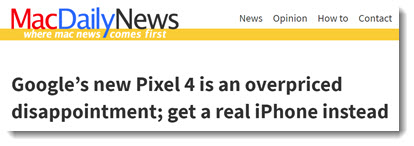
Google has two new phones, the Pixel 4 and Pixel 4 XL. They’re quite nice. If you had one, you’d like it. They might not tempt iPhone users to leave the Apple world, but anyone with an Android phone should consider a Pixel 4, now available through all the carriers.
You’re a careful shopper, so you run a quick Google search. What you will find is deeply misleading. We have a problem.

I’m going to talk about the Pixel 4 because I’m familiar with it and it makes a good example, but the issue is a much larger and more difficult one. Journalists and writers are driven today to be hypercritical – to draw broad conclusions on little evidence; to condemn things with flamboyant generalizations; to ignore nuance and ignite controversy.
Tech journalism today is a game of gotcha. Nothing is good enough; everything has flaws. Of course, I see this mostly in tech journalism because I read tech stories constantly, but all too much news coverage today in every area is driven by the same incentives and reaches the same result.
When we look at headlines or Google search results, we are drawn to stories with sensational headlines and extreme conclusions. Mouse clicks drive the revenue for news organizations and social networks, and they have learned that condemnation draws more clicks than nuanced analysis.
It’s a particular problem in technology in 2019 because the industry is settled and boring, almost stagnant. Phones are metal and glass sandwiches. Cameras are steadily improving. Hardware features appear and disappear. Prices go up and down. There is very little to say about a phone released this year that you couldn’t have said last year or the year before. That might be true, but it makes for dull reporting.
Instead, you get this.




A bit of history. Google released Nexus phones for several years, then changed the name and now has released Pixel phones for four years. It has experimented with the balance of prices and features; it has occasionally stumbled on poor hardware choices; and it has had trouble finding its footing in a market dominated by Apple and Samsung, which are much better at advertising and have better relationships with the carriers.
Last year Google made a big step forward with the Pixel 3 and Pixel 3 XL, impressive phones with the best cameras on the market, but priced a little high and savaged mercilessly for an oversized notch on the front screen and a couple of early hardware issues.
Earlier this year, Google introduced budget alternatives, the Pixel 3a and Pixel 3a XL, with dramatically lower prices and moderately cheaper materials, but the same excellent cameras and other features. Today they are the best inexpensive phones you can buy, bar none. (As low as $250 if you catch a Cyber Monday sale!)
The Pixel 4 and Pixel 4 XL are the new flagship releases. The initial prices were too high, so Google discounted each one by $200 for Black Friday. The sale price, of course, has infuriated early buyers because fury is our default mode in 2019.
The Pixel 4 phones are exactly what you’d expect from an incremental upgrade. They’re faster and run more smoothly, the display is crisper, there is more storage and memory, and the camera is slightly improved from what was already the best in class.
So what’s the problem?

The battery in the Pixel 4 is a bit small for heavy phone users. Does that justify the above headline? “Brilliant camera, slick features and small size mean nothing.”

The Pixel 4 uses facial recognition to unlock the phone instead of a fingerprint. I was unsure about that at first, but a month’s experience has convinced me that it is a step forward that most people will appreciate. My Pixel 4 is looking for me when when I want it to be looking for me, as if by magic, and it unlocks instantly – not after a second or two but instantly.
There are always trade-offs between convenience and security. Google chose to have the phone recognize a wide variety of expressions and variations in your appearance – even if your eyes are closed.
That means the phone can be unlocked if it’s held up to your face while you’re asleep. That’s a genuine concern for some people. Google has said that it intends to add an “alertness” switch that will only allow the phone to be unlocked when your eyes are open.
All too many journalists, though, seized on that as the “massive” security problem that allows them to condemn the phones in angry headlines.
(It’s worth noting that I’m a white male, the most likely subject to have good results with facial recognition. Google has worked extensively to make its facial recognition work on different skin tones and face shapes, but this technology is still evolving and other groups may not have as easy a time as I describe.)

The nitpicking goes on and on. Some issues deserve to be called out to tech enthusiasts, but it would only take a little bit of effort to point out that these are issues that have no relevance to mainstream non-tech users. The 90Hz refresh rate on the screen drops to 60Hz under some conditions! 64Gb of storage is “pitiful” when other phones offer more! The Pixel 4 will not record 4K video at 60fps, which is just insane!
The reality is that the specs of the Pixel 4 phones are well chosen for the 90 to 95% of the market who are mainstream non-tech users, and the Pixel 4s have important features that make them a better choice than Samsung phones. The operating system on Pixel 4 phones is a clean version of Android without Samsung’s quirks and duplicative apps. There’s no Bixby. It’s a better experience at a competitive price – a better price now after Black Friday.

I hope it’s obvious that I’m not talking only about Pixel phones. You’ll have to bring skepticism to bear on anything you search for today, whether it’s technology, political news, or shopping reviews. Clicks drive our world, and the desire for clicks leads to extreme content. Technology journalism seems overcome by a wave of negativity. Political reporting is driven by partisanship and fabrications. Amazon is struggling with counterfeits and phony reviews. Be skeptical and try to seek out balance and nuance instead of reflexively clicking on the most negative headline.

Good points. The Pixel 4 is an excellent piece of hardware and I am happy to have it. I paid the introductory price minus the trade-in of my Pixel 3. My only annoyance is that the radar aspect is disabled out of the USA. I live outside of the country for most of the year. Seems a silly thing to disable out of the country. Facial recognition is fine, but a little more finicky than the iPhone 11 – I have to extend the phone further from my face sometimes for it to wake up.
I bought a Moment case and a wide lens to help in situations where I need a photo with a broader view.
I expect I will keep and hold this one for a couple of years at least.